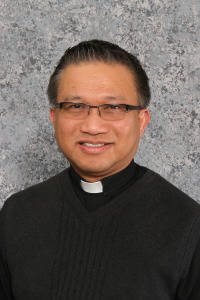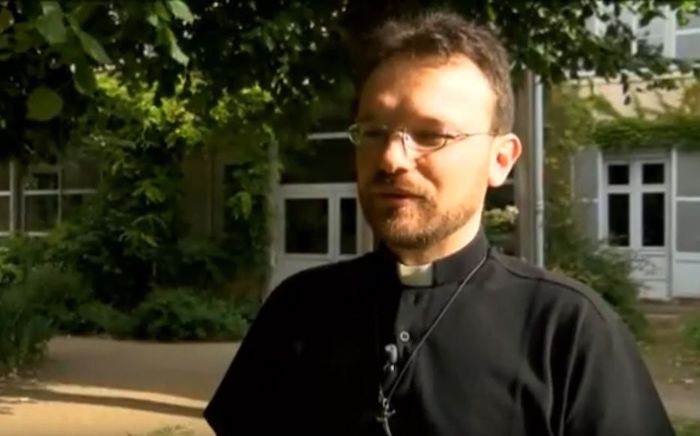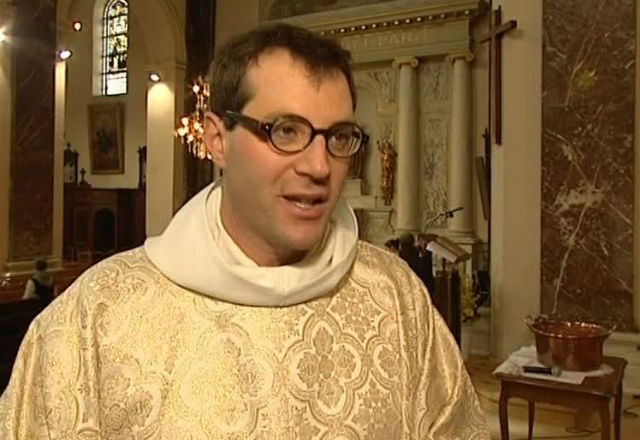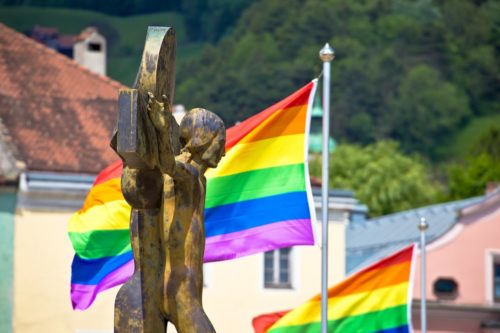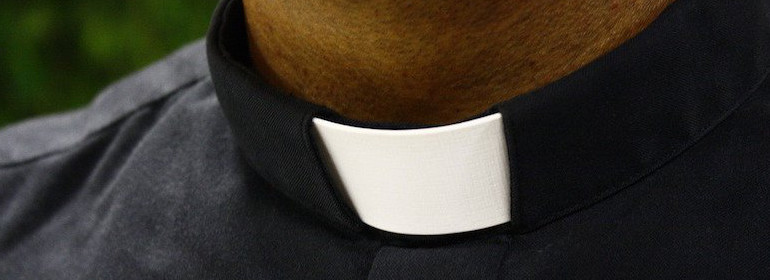— Now He Explores How It Changed an Aspiring Nun Who Died by Suicide

“It’s really given me the courage to tell my own story, which has been an incredibly healing process for me,” Simon Kent Fung — host of the ‘Dear Alana,’ podcast
by Brian Brant
As a teenager growing up in Colorado, Alana Chen — known by loved ones for her generosity and kindness to others — dreamed of becoming a nun.
But Alana’s life came to a tragic end on Dec. 8, 2019, when she died by suicide at just 24 years. Now a new podcast, Dear Alana, explores the diaries she wrote as a young woman trying to reconcile her strong Catholic faith with her sexual identity — an exhausting challenge that drove her to conversion therapy.
According to the podcast, Alana attended two church summer camps in Boulder when she was 13 years old: Sacred Heart of Mary Catholic Church and St. Thomas Aquinas Catholic Center on the University of Colorado Boulder Campus, where she met and soon entrusted a priest at St. Thomas Aquinas, who would eventually become her spiritual director.
With the help of her best friend, Alana began sneaking behind her mother’s back to attend early evening mass at St. Thomas. Then, one day, she told her mom the truth.
“She just said, ‘I’m sneaking out. I lied. I’ve been going to mass every day at 5:30, taking the bus,'” her mother, Joyce Calvo, tells PEOPLE.
“I just remember saying, ‘Why? Why are you doing that?’ She said, ‘I love it,'” adds Calvo, who was shocked by her daughter’s goal of nunhood. Although she hadn’t been a religious person in her youth, Calvo’s sobriety journey sparked the search for a spiritual home for family.
But Alana was hiding another secret: she was struggling with her sexual identity. At 14, Alana came out to the priest, who instructed her not to tell anyone, not even her family, according to the podcast.
:max_bytes(150000):strip_icc():focal(723x147:725x149):format(webp)/simon-kent-fung-083123-1e444f4a791642a79132c2840cbec81c.jpg)
“[He] noticed me. He knew me. He knew I loved God. He knew I did not want to marry a man,” Alana wrote in one of her journal entries. “He forgave my unspeakable sin. He took my defilement and buried it. ‘You ought to pray the rosary everyday.’ Later, he said, ‘I better pray it five times per day to keep temptation away.'”
The priest did not return PEOPLE’s request for comment, but the Archdiocese of Denver — where he is now a diocesan hermit, a monk-missionary, per his blog — says in a statement: “Commenting on specifics regarding Alana Chen is improper, but as the Archdiocese of Denver has previously stated, conversion therapy was never practiced. Trying to explain Alana’s story with a simplistic explanation is unfair to her memory. We reject any practices that are manipulative, coercive, or pseudoscientific. Alana, and every person, is beloved by God and deserves to be treated with mercy, dignity, and reverence. We continue to pray with and for everyone who is affected by Alana’s untimely death.”
St. Thomas Aquinas Catholic Center says in a separate statement: “Our deepest prayers and condolences continue for the Chen family, who experienced the tragic loss of their daughter, Alana. The St. Thomas Aquinas Catholic Center does not practice conversion therapy and remains against any form of coercion or manipulation. As Catholics, we reverence the dignity and free will of each and every human person and view every person’s life as a beautiful gift from God. We strive to live and preach the Gospel of Jesus Christ and embrace the teachings of the Catholic Church.”
Reflecting on the revelations in her daughter’s journals, Calvo tells PEOPLE, “I love the Saints and Mary and Jesus, but [in] a lot of churches, I didn’t like the language and how strict it was. That’s why I was always church-hopping. But I was shocked [by] this, what he was doing, seeing her in private.”
The journals and podcast claim Alana spent years seeking pastoral counsel and receiving conversion therapy treatment, practitioners of which “commonly use an array of psychosocially harmful techniques,” according to the American Psychological Association.
Her nearly two-dozen journals explore the pain she experienced as a result of conversion therapy, which she publicly opened up about in The Denver Post in August 2019.
“I felt a lot of shame and anxiety,” Alana told the Post. “I couldn’t sleep. I couldn’t stop thinking about it. Was I going to hell? But I was still extremely faithful, and I felt like the church and the counseling was the thing that was saving me. The worse I got, the more I clung to it.”
Alana said she eventually broke free from conversion therapy after a suicide attempt that led to her receiving professional mental health treatment.
“I was feeling so much shame that I was comforted by the thought of hurting myself,” she told the newspaper of her heartbreaking mindset. “I’ve now basically completely lost my faith. I don’t know what I believe about God, but I think if there is a God, he doesn’t need me talking to him anymore.”
Four months after the Post interview, she vanished and was found dead by suicide. Nearly four years later, her life is the basis of the eight-episode podcast. In the series, host Simon Kent Fung explores his personal connection to Alana’s story, the origins of conversion therapy and the death of a young woman who, according to Fung, “had it all.”
:max_bytes(150000):strip_icc():focal(424x0:426x2):format(webp)/Alana-Chen-3-082923-c06d04caca04401e96136bafbe9b4239.jpg)
“I learned about Alana’s story in the news, like a lot of people did,” Fung, a gay Catholic man, tells PEOPLE. “I think what stuck out to me was how devout and religious she was and her family’s suspicion of the role that that community played, as well as the role that conversion therapy played in her disappearance and death.”
Fung — who has worked in tech at Patreon and Google and as a designer at Time — says he “recognized very similar experiences in my own life with my faith community and with the subculture of the American Catholic Church that I was a part of.”
Ashamed of his sexual identity, he spent “all of my twenties in various forms of conversion therapy in my attempt to become a priest,” Fung says. During this period, he was taught that his sexuality was “the result of an underdeveloped bonding with my father and male peers and encouraged to deconstruct his attractions in order to connect them to trauma.”
“I remember I was in a coffee shop and I just read [her story], and I was just sobbing in the corner by myself … I couldn’t believe that somebody had an almost identical story, at least from the way it was reported,” Fung says. “I didn’t know all the details.”
Fung was then inspired to reach out to Calvo. “A couple of months later, we had our first phone conversation,” he says.
He soon began traveling back and forth between Colorado and California to speak with Calvo, Alana’s sisters and her friends, ultimately deciding to create the podcast.
“In the two years of making this, I had this incredible privilege of being able to read about Alana’s inner life through the journals that her family provided me,” he says.
As Fung learned about Alana’s life outside of what was reported, the host began to understand who she was and the inner turmoil she went through.
“She had many friends [and] was kind of this all-star child and young person,” the host says. “She was an ultimate frisbee champ. She was a top student, getting all the best grades. She was this extremely active kid in her church, but it was really when she was a teenager, an early teenager, that she became more serious about her faith and met a priest who offered to be her spiritual director.”
Alana “sought out conversion therapy” for the next seven years under the guidance of the priest and other spiritual leaders, hoping to “fix herself” to become a nun, according to Fung.
In addition, Alana pursued two years of individual counseling from the ages of 18 to 20 with a therapist she sought through her spiritual mentors and provided by the Archdiocese of Denver, Fung tells PEOPLE in a statement.
Alana attended meetings with Courage International, a Catholic ministry “whose founder explicitly encouraged conversion therapy and whose writings are based on conversion therapy theorists,” he adds. Throughout her treatment, she was “consistently” directed to conversion therapy resources, blog posts and spiritual programs by spiritual mentors like priests and nuns, he claims.
Alana was even referred to a conversion therapist who was formerly on the board of the National Association for Research and Therapy of Homosexuality, the largest clinical network of conversion therapy practitioners, Fung says. In 2014, the organization rebranded as the Alliance for Therapeutic Choice and Scientific Integrity, which did not return PEOPLE’s request for comment.
The American Psychiatrist Association said it has been “opposed” to “any psychiatric treatment, such as ‘reparative’ or conversion therapy, which is based upon the assumption that homosexuality per se is a mental disorder or that a patient should change his or her homosexual orientation,” since 1998.<
Colorado is one of the 22 states, in addition to the District of Columbia, to ban conversion therapy for minors, per the Movement Advancement Project, an LGBTQ think tank.
However, Colorado’s 2019 law, which was passed months before Alana died, may not have fully protected her — not only because she was over the age of 18, but also because the law doesn’t touch pastoral counseling and only prohibits state-licensed medical or mental health care providers from the controversial practice, the Post noted.
:max_bytes(150000):strip_icc():focal(532x0:534x2):format(webp)/Alana-Chen-1-082923-b703f217c1f345c2b98eb1e82d366dd8.jpg)
Fung says “a lot of people are unaware” that conversion therapy is happening and that what’s depicted in Hollywood is often far from the reality of what people experience.
“I think the podcast shows the ways in which conversion therapy doesn’t have to look like a very Hollywood, physically violent form or very dramatized way,” he adds. “It can look like talk therapy. It can look like it happened in a clinical setting.”
“A lot of us go down the rabbit hole of believing these ideas and really struggling with what I call a triple shame,” Fung continues. “First of all, the shame of being gay or feeling different in this way, the shame of feeling like you’ve had something horrible happen to you that makes you damaged in this way. Then the shame of not being able to change.”
“I just felt so damaged and broken,” he shares of his experience with conversion therapy. “I think that’s the impact and the harm that it has on people.”
In order to stop conversion therapy, the host argues, it’s important to foster conversations within churches in a “compassionate and sensitive way rather than an antagonistic, accusatory way.”
Alana’s story has paved the way for a new mission: the Alana Faith Chen Foundation, launched by her family to provide “financial support to LGBTQ+ [people] who are at risk of suicide so that they can receive the mental health treatment and therapy they need on their path to healing,” per their website.
:max_bytes(150000):strip_icc():focal(749x0:751x2):format(webp)/Joyce-Calvo-082923-12031cd566fa439e97ffa88efc5e3cf7.jpg)
Though Calvo says a priest and people at church would come up to her to tell her Alana was a “saint,” she never wanted to put that pressure on her daughter.
Still, Alana “always wanted to help people,” she says, and the foundation is a “beautiful tribute to Alana and keeps Alana’s desires going.”
Meanwhile, Fung hopes Alana’s story and the podcast help others as much as they’ve helped him.
“It’s really given me the courage to tell my own story, which has been an incredibly healing process for me,” he adds. “I hope in hearing that, other people will feel similarly and will feel they’re not alone.”
Complete Article ↪HERE↩!


